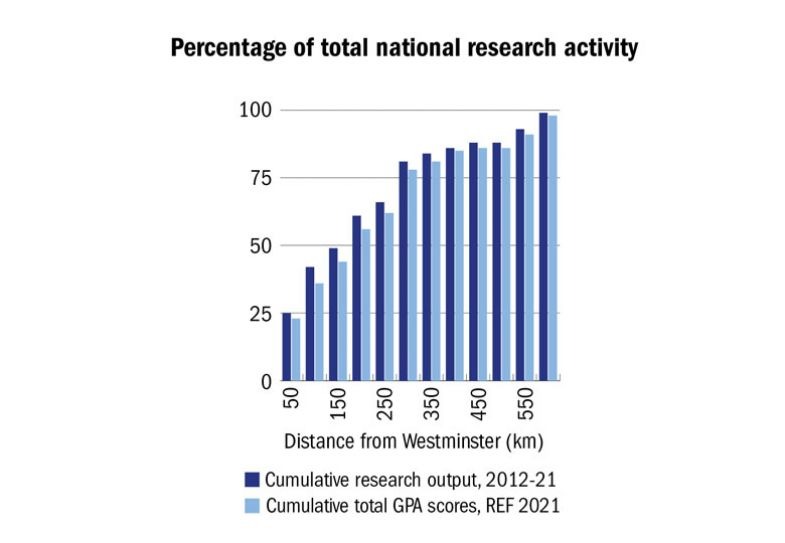Research quality is more evenly distributed across the UK than funding or output, according to an analysis of performance by distance from the capital, suggesting that the London-Cambridge-Oxford golden triangle is “no more golden” than other regions’ research and may benefit from “toxic cultural bias”.
A report on the role of regional research in levelling up, published by the Higher Education Policy Institute (Hepi) on 18 January, finds that about half of total UK research funding reported to the 2021 Research Excellence Framework (REF) went to institutions within a 140km radius of London.
However, when looking at the cumulative total grade point average (GPA) scores awarded by peer panels in the REF, a measure of research quality, these are “more evenly distributed with distance from Westminster than is output”, the authors find.
Looking at cumulative gross domestic product (GDP) as distance from London increases against REF 2021 GPA also suggests that “GDP is benefitting from research excellence at about the same rate throughout the country”.
On that basis, the report argues, the “golden triangle around London lays an egg that is no more golden than any other part of the country’s research base”. The golden triangle “absorbs more of the country’s research investment and sustains more volume, but it does not evidently deliver research that is – on average – much more highly rated nor enhance the relative GDP of the region beyond that achieved elsewhere,” it adds.

Given that “research quality is more evenly distributed across the UK than is funding or volume output”, disparities in research funding across the UK “may reflect a retained and somewhat toxic historical and cultural bias towards particular institutions”, the report also says.
Instead of using “lumpy” breakdowns of research funding and performance by UK region, the report identifies three key urban-focused concentrations beyond the south east: the Birmingham area, the trans-Pennine M62 corridor including Manchester and Leeds, and the Scottish central belt running between Glasgow and Edinburgh.
The report is written by Jonathan Adams, chief scientist at the Institute for Scientific Information at Clarivate and visiting professor at the Policy Institute at King’s College London; Jonathan Grant, director of the consultancy Different Angles and former vice-principal and vice-president (service) at King’s; David Smith, emeritus professor of higher education at Glasgow Caledonian University; and Martin Szomszor, founder of Electric Data Solutions, who led work to create the REF 2014 impact case studies database.
Dr Adams said the “new distance analysis shows that the quality in the regions is just as good as the south east, but there’s less activity because of lower investment”.
The distance analysis, he continued, demonstrated that “the ‘regional’ type of analysis masks the real concentration in big cities and bands such as the M62 corridor”.
Further, the analysis showed that there is “little dissemination [of research] outside those hotspots; indeed, the big civics [civic universities in the regions] collaborate more – and diffuse IP more – overseas than they do within the UK,” Dr Adams continued.
The report argues that the “stretched” UK science budget “cannot be the prime lever to shift the levelling-up agenda”, instead highlighting proposals such as those from former Labour prime minister Gordon Brown’s commission for “devolved regional government, associated with devolved spending powers”.
Dr Adams said the science budget amounted to “less than 1 per cent of total government spend. It is therefore absurd to think that it can be an effective lever to redress regional inequalities caused by decades of post-industrial decline.”
Register to continue
Why register?
- Registration is free and only takes a moment
- Once registered, you can read 3 articles a month
- Sign up for our newsletter
Subscribe
Or subscribe for unlimited access to:
- Unlimited access to news, views, insights & reviews
- Digital editions
- Digital access to THE’s university and college rankings analysis
Already registered or a current subscriber?








